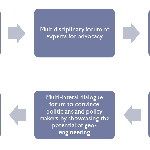Please find below the
Semi-Finalist Evaluation
Judges'' ratings
| • | Novelty: | |
| • | Feasibility: | |
| • | Impact: | |
| • | Presentation: |
Judges'' comments
General notice to Geoengineering proposal authors:
After much consideration, the Judges have decided that the submitted proposals did not address the contest prompt sufficiently enough to warrant awarding Finalists or Winners. However, the entries did present interesting ideas, and so a number of proposals have been selected to re-open and edit their proposals during the revision period to continue to refine their work with the Judges’ feedback, as well as vie for an Honorable Mention award. The recipient will be invited to showcase their work at the Climate CoLab conference.
Judges Comments:
This is a possible global governance model. It is clearly structured, and puts multidisciplinary assessment at the centre of the decision-making process. However, it is simplistic in several regards. Giving geoengineering proposals a RAG rating is unlikely to be straightforward, both for reasons for inherent complexity/difficulty of assessment, and also because there are bound to be external pressures. How would conflicts be resolved? I would also like the author to explain a process by which we might arrive at this governance set-up. Is it practically attainable? International organisations can't set up an arrangement of this sort on their own account, it will have to be done by governments (the only source of legitimacy in global governance). Is it likely that governments would chose this governance model? Also, how is an international body empowered to make certain behaviours at the national level "illegal" and to police them? Overall, it's a reasonable starting point, but requires further thought particularly about the practicalities/politics and about the management of uncertainty.
As a proposal for governance of CE, this boils down to the following: 1) Establish an international steering committee of officials; 2) this committee does assessments of proposed CE interventions, summarizing them into three categories (good, mixed/uncertain, bad); 3) international and national officials allow or prohibit projects on basis of this assessment. This is unobjectionable as far as it goes, but it presumes the answer to all the most difficult governance questions: how would such an international committee get given such authority? How would it do such assessments -- and what makes it likely that their assessments (and available research) would ever generate sufficiently clear and authoritative outcomes? Even presuming such clear assessment answers, how could the committee get international political bodies, even more so national governments, to act upon its authority?
Anita and Ben: We appreciated that you thought through a structure and system, but ultimately we agree with John and Ted's assessment that you need to take the plan both farther and deeper. Even though it presents a feasible plan, that does not mean that it would be effective or add much to the status quo.
Going forward, Ted and John have articulated a number of questions and critiques that we would like to see you address. Some of these questions are relatively easy to answer, while others cut to the core question of whether your strategy would be likely to succeed. Over the next few weeks we would like to see you grapple with those questions and see if you can take your proposal to another level of sophistication.
No comments have been posted.
